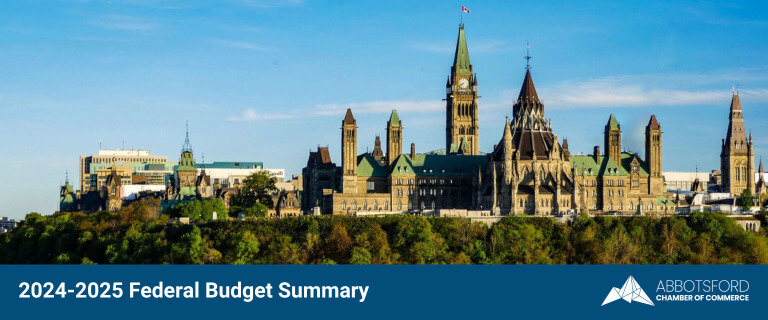
For Immediate Release
ABBOTSFORD, B.C., - April 17th, 2024
Abbotsford Chamber of Commerce 2024-2025 Federal Budget Summary
The 2024-2025 Federal Budget was presented by Finance Minister Chrystia Freeland on April 16th in Ottawa. The new budget outlines the spending and taxing priorities for the government over the coming year.
Below, read the Abbotsford Chamber's initial recap of the key announcements in the 2024/25 federal budget. The Chamber will continue to engage with the federal government on how this budget will effect our members.
Read other summaries from Abbotsford Chamber members:
MNP's Budget Summary >
Grant Thornton's Budget Summary >
KPMG's Summary of Tax Changes >
Overall Budget Summary
The Canadian deficit continues to grow with this budget including a $39.8 billion deficit. This rising debt reduces government's ability to spend elsewhere as debt carrying costs are set to rise to $54 billion this year alone. The proposed ‘soft landing’ foresees GDP growth of 0.7 per cent in 2024 and 1.9 per cent in 2025. The unemployment rate is expected to rise to a peak of 6.5 per cent in the fourth quarter of this year and average 6.3 per cent in 2024. Stronger economic activity has led to an increase of $56 billion in nominal GDP for 2024 compared to 2023 estimates, and is expected to be $39 billion greater each year on average in future years.
Budget Highlights
Infrastructure and Transportation
There was no new additional funding for public transit infrastructure or any commitment to accelerate the new permanent public transit fund planned to start in 2026-2027.
Budget 2024 proposes to provide $6 billion over 10 years, starting in 2024-25, to Infrastructure Canada to launch a new Canada Housing Infrastructure Fund to accelerate the construction and upgrading of housing-enabling water, wastewater, stormwater, and solid waste infrastructure that will directly enable new housing supply and help improve densification.
Capital Gains
Government intends to increase the inclusion rate on capital gains realized annually above $250,000 by individuals and on all capital gains realized by corporations and trusts from one-half to two-thirds, making more capital gains taxable and potentially impacting owners on the sale of their businesses.
The Lifetime Capital Gains Exemption will be increased on June 25 to $1.25 million to allow for more tax-free capital gains for the sale of small business shares, which will positively impact small business owners.
A new Canadian Entrepreneurs’ Incentive will also reduce the capital gains inclusion rate to 1/3 (33.3%) on up to $2 million in eligible capital gains from selling all or part of a business. The incentive will ramp up over 10 years, hitting $2 million in 2034. However, at this time professional corporations, as well as businesses in insurance, real estate, food and accommodation, arts, recreation, entertainment or consulting services are excluded. Combined with the budget’s proposed increased lifetime capital gains exemption (LCGE) of $1.25 million from $1,016,836, entrepreneurs will have a combined exemption of at least $3.25 million when selling all or part of a business, once the incentive is fully rolled out.
Housing
Government released a strategy to build two million net new homes by 2031 (for a total of 3.87 million homes):
- $400 million for the Housing Accelerator Fund to enable more housing construction
- Opening up federally owners lands and properties for housing and partnering with developers and builders to build homes in those areas, including on Canada Post and National Defence lands, and through converting underused and vacant federal offices
- The government will consider introducing a new tax on residentially zoned vacant land. The government will launch consultations later this year.
- $15 billion in new loan funding and expansion of terms for the Apartment Construction Loan Program
- Allowing 30-year mortgage amortizations for first time buyers buying new-builds, and increasing the amount of money that can be withdrawn penalty-free from RRSPs for home purchases.
- $976 million over 5 years to build deeply affordable housing, supportive housing, and shelters for our most vulnerable, $477.2 million over five years to support affordable housing providers to acquire and preserve units, and an additional $1.3 billion over four years for Reaching Home: Canada's Homelessness Strategy
Other Initiatives
- To incentivize investment in innovation-enabling and productivity-enhancing assets, Budget 2024 proposes to allow businesses to immediately write off the full cost of investments in patents, data network infrastructure equipment, computers, and other data processing equipment.
- $2.4 billion package of measures around AI and building jobs around AI and boosting AI adoption to support productivity. This includes $2 billion in funding to provide access to AI infrastructure for researchers and industry, and $200 million to support AI start-ups and adoption of AI in key sectors like manufacturing, healthcare and agriculture.
- $1.5 billion over 5 years to launch national pharmacare coverage for a number of contraception and diabetes medications, and an ongoing run cost nearly half a billion annually.
- $6.1 billion over six years, beginning in 2024-25, and $1.4 billion per year ongoing, for a new Canada Disability Benefit
- Measures to help clarify and reduce timelines for major projects like mining, energy and other projects. This includes setting targets for federal impact assessments and permitting processes and driving cultural changes to get projects built faster.
- Launching the first-ever Canadian Survey on Interprovincial Trade in June 2024, to engage thousands of Canadian businesses on the challenges they face when buying, selling, and investing across provincial and territorial borders. The survey's insights will help identify top interprovincial barriers so that they can be eliminated.
Commentary:
"The new federal budget was an opportunity for Government to assist Canada's businesses in driving the economic growth our communities need. Instead, Canadians will be saddled with more debt as we continue to fall behind on overall affordability, alongside low productivity that harms all sizes of businesses."
"The Federal Government's significant focus on housing can't be separated from the critical need to invest in trade-enabling infrastructure, particularly in the Fraser Valley. From flood mitigation infrastructure to protect Canada's most productive agricultural land and contribute to food security, to larger investments in transportation and transit infrastructure connecting the Valley with Metro Vancouver, this budget fell short commitments that are needed to drive growth, jobs, and economic activity."
- Alex Mitchell, CEO, Abbotsford Chamber of Commerce
"Today’s budget contains few surprises. Most of the major new spending was announced by the government over the last few weeks, and the government’s projections for the deficit are largely in line with previous predictions. Instead of using a revenue windfall to reduce the deficit more quickly, the government chose to use it along with changes to the capital gains tax, to fund this new spending.
What’s still missing is a clear plan to promote productivity and restore economic growth in Canada. Canada continues to slip further behind our competitors in both of these categories.
Our lagging productivity and stalled GDP growth means Canadians are becoming collectively poorer and working harder to just remain where they are today. Among the positive announcements in today’s Budget, we’re happy to see a focus on streamlining internal trade. Strengthening our internal trade could elevate GDP growth by up to 8% and fortify Canada’s economic foundation. It shouldn’t be easier to trade with Europe than it is within our own country"
- Perrin Beatty, President and CEO, Canadian Chamber of Commerce
Ongoing Issues:
Early in the second quarter of 2024, Canada’s economic climate remains bleak. Last year, our GDP grew by only 1.1%, and the Bank of Canada predicted this week that it will grow by only 1.5 per cent in 2024. In addition, Canada’s productivity fell in 11 out of the past 12 quarters, undermining our global competitiveness and leaving Canadians collectively poorer. But the government cannot tax and spend us back to prosperity. Instead, it must unlock the ability of Canadian businesses to innovate, invest and grow.
More Resources:
Full Budget 2024 >
Canadian Chamber of Commerce Summary >
Canadian Chamber of Commerce Expert Commentary >
MNP's Budget Summary >
Grant Thornton's Budget Summary >
KPMG's Summary of Tax Changes >
Media enquiries:
Nathalie Darwin, Administration & Communications Manager
Abbotsford Chamber of Commerce
hello@abbotsfordchamber.com
